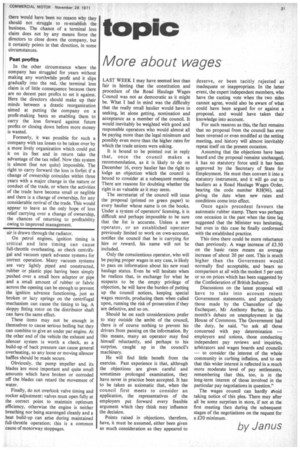topic
Page 31

If you've noticed an error in this article please click here to report it so we can fix it.
More about wages
LAST WEEK I may have seemed less than fair in hinting that the constitution and procedure of the Road Haulage Wages Council was not as democratic as it might be. What I had in mind was the difficulty that the really small haulier would have in seeking, let alone getting, nomination and acceptance as a member of the council. It would inevitably be weighted with good and responsible operators who would almost all be paying more than the legal minimum and possibly even more than the higher rates for which the trade unions were asking.
It is bound to be pointed out in reply that, once the council makes a recommendation, as it is likely to do on December 16, every haulier has the right to lodge an objection which the council is bound to consider at a subsequent meeting. There are reasons for doubting whether the right is as valuable as it may seem.
The secretariat of the council will issue the proposal (printed on green paper) to every haulier whose name is on the books. Under a system of operators' licensing, it is difficult and perhaps impossible to be sure that the list is accurate. Unless a new operator, or an established operator previously limited to work on own-account. notifies the council that he is carrying for hire or reward, his name will not be included.
Only the conscientious operator, who will be paying proper wages in any case, is likely to pass on information about his new road haulage status. Even he will hesitate when he realizes that, in exchange for what he suspects to be the empty privilege of objection, he will have the burden of putting up the council notices, keeping special wages records, producing them when called upon, running the risk of prosecution if they are defective, and so on.
Should he on such considerations prefer to stay outside the ambit of the council, there is of course nothing to prevent his drivers from passing on the information. By this means, many an operator may find himself reluctantly, and perhaps to his surprise, caught up in the council's machinery.
He will find little benefit from the exercise. Past experience is that, although the objections are given careful and sometimes prolonged examination, they have never in practice been accepted. It has to be taken as axiomatic that, when the council first meets to consider an application, the representatives of the employers put forward every feasible argument which they think may influence the decision.
Points raised in objections, therefore, have, it must be assumed, either been given as much consideration as they appeared to deserve, or been tacitly rejected as inadequate or inappropriate. In the latter event, the expert independent members, who have the casting vote when the two sides cannot agree, would also be aware of what could have been argued for or against a proposal, and would have taken their knowledge into account.
For such reasons as this, the fact remains that no proposal from the council has ever been reversed or even modified at the setting meeting, and history will almost inevitably repeat itself on the present occasion.
Assuming that the objections have been heard and the proposal remains unchanged, it has no statutory force until it has been approved by the Secretary of State for Employment. He must then convert it into a statutory instrument, and it will go out to hauliers as a Road Haulage Wages Order, bearing the code number RH(96), and giving the date when new rates and conditions come into effect.
Once again precedent favours the automatic rubber stamp. There was perhaps one occasion in the past when the time lag suggested that the Minister was hesitating, but even in this case he finally conformed with the established practice.
This time there could be more reluctance than previously. A wage increase of £3.50 on the basic rates means an average increase of about 20 per cent. This is much higher than the Government would normally find acceptable, and bears no comparison at all with the modest 5 per cent or so on prices which has been suggested by the Confederation of British Industry.
Discussions on the latest proposal will have to take into account recent Government statements, and particularly those made by the Chancellor of the Exchequer, Mr Anthony Barber, in this month's debate on unemployment in the House of Commons. The Government had the duty, he said, "to ask all those concerned with pay determination — employers and unions, those conducting independent pay reviews and inquiries, arbitrators and wages boards and councils — to consider the interest of the whole community in curbing inflation, and to see that this wider interest is reflected in a much more moderate level of pay settlements, remembering that this, too, is in the long-term interest of those involved in the particular pay negotiations in question."
The wages council can hardly atroid taking notice of this plea. There may after all be some surprises in store, if not at the first meeting then during the subsequent stages of the negotiations on the request for a £20 minimum.
by Janus


















































































